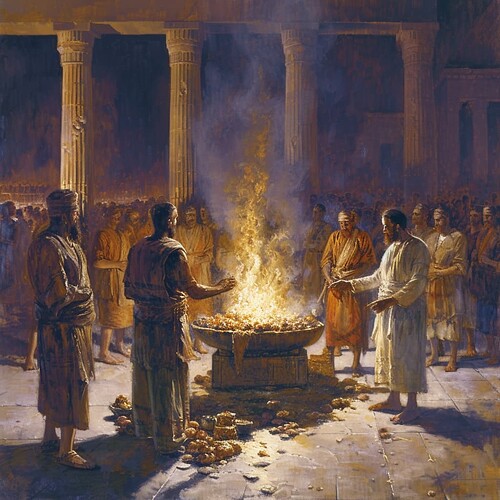 February 28: Leviticus 3, 4: Understanding Holiness and Atonement in Sacrifices
February 28: Leviticus 3, 4: Understanding Holiness and Atonement in Sacrifices
 Introduction
Introduction
An often overlooked book in the Bible, Leviticus, presents us with essential insights into God’s nature and the concept of holiness. Today, we focus on Chapters 3 and 4, which highlight the importance of sacrifices, sin offerings, fellowship offerings, and the process of atonement.
 Leviticus 3 - Fellowship Offerings
Leviticus 3 - Fellowship Offerings
Here, we find meticulous instructions on fellowship offerings—an act of communal worship. The animals to be offered—be it from the herd or flock—had to be without defect underlining the requisite element of perfection connected with holiness.
![]() Key Verse: Leviticus 3:1 “If your offering is a fellowship offering, and you offer an animal from the herd, whether male or female, you are to present before the LORD an animal without defect.”
Key Verse: Leviticus 3:1 “If your offering is a fellowship offering, and you offer an animal from the herd, whether male or female, you are to present before the LORD an animal without defect.”
 Leviticus 4 - Sin Offerings
Leviticus 4 - Sin Offerings
In Chapter 4, we journey through the necessity and process of sin offerings. These offerings were a means of atonement for unintentional sins, highlighting God’s mercy and provision for human frailty.
![]() Key Verse: Leviticus 4:35 “They shall remove all the fat, just as the fat is removed from the lamb of the fellowship offering, and the priest shall burn it on the altar on top of the LORD’s food offerings. In this way, the priest will make atonement for them for the sin they have committed, and they will be forgiven.”
Key Verse: Leviticus 4:35 “They shall remove all the fat, just as the fat is removed from the lamb of the fellowship offering, and the priest shall burn it on the altar on top of the LORD’s food offerings. In this way, the priest will make atonement for them for the sin they have committed, and they will be forgiven.”
 Key Themes and Reflections
Key Themes and Reflections
- Holiness and Perfection: God’s unblemished character is reflected in the requirement of spotless animals for offerings. It pushes us to strive for holiness in our lives.
- Mercy and Atonement: With the provision for sin offerings, we see God’s compassionate nature, His forgiveness for unintentional sins, and the notion of atonement—a precursor to Jesus’ ultimate sacrifice for our sins.
 Today’s Application
Today’s Application
For Christians today, understanding these principles helps us grasp the gravity of Jesus’ perfect sacrifice on the cross. His was the ultimate fellowship and sin offering, making full atonement for our sins. We are guided to intentionally pursue a life of holiness and virtue, to offer our best selves in service to God, recognizing His mercy and compassion.
 Hidden Gem
Hidden Gem
In these rigid rituals, we can glean the important teaching of mindfulness, purity, and respect towards our actions, an imperative for our spiritual journey.
 Reflective Q&A
Reflective Q&A
![]() Why were fellowship offerings important?
Why were fellowship offerings important?
A: Fellowship offerings symbolized peace and communion, reiterating the essence of community in worship.
![]() Why were sin offerings for unintentional sins necessary?
Why were sin offerings for unintentional sins necessary?
A: Sin offerings were God’s provision for human frailty and signified His understanding, mercy, and compassion.
![]() How do these Old Testament rituals translate to Christian faith today?
How do these Old Testament rituals translate to Christian faith today?
A: They lay the groundwork for the understanding of Jesus’ sacrifice, emphasizing the need for holiness, purity, atonement, and forgiveness.
 Join the Discussion:
Join the Discussion:
Reflect upon the character of God revealed in these chapters. How has this understanding influenced your perspective of atonement and holiness?
 See You Tomorrow in Leviticus 5, 6:
See You Tomorrow in Leviticus 5, 6:
We’ll be diving deeper into the laws of guilt offerings and the ordination of priests. Join us as we continue this enlightening journey through Leviticus.
